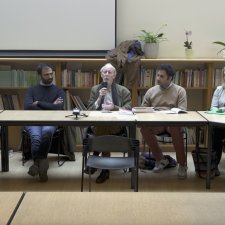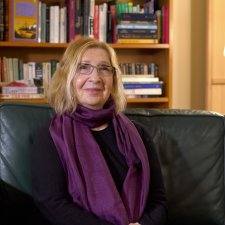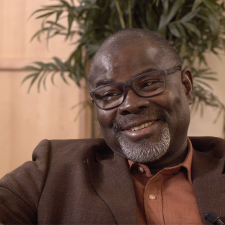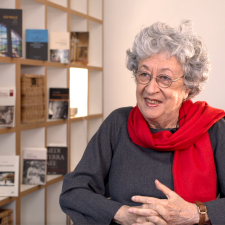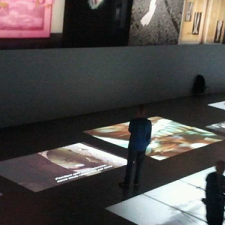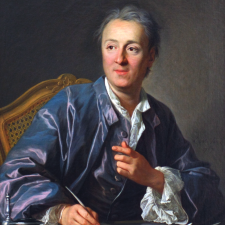Chapitres
- Introduction of Knut Eliassen00'45"
- Subject of research01'18"
- About Suger00'26"
- First experience at Maison Suger01'48"
- Benefits of Suger01'03"
Notice
Retranscription
My name is Knut Ove Eliassen. I'm Norwegian. I'm a professor in comparative literature at the Norwegian University of Science and Technologies in Trondheim. I've been working as a professor in comparative literature for almost 30 years. I was originally trained as a philosopher in Paris 40 years ago. Eventually, I changed my path and wrote my doctoral dissertation on literary history on a Spanish author from the 17th century, hence I gradually moved over into comparative literature, and that's what I've been doing for the last decades. My original interest was French philosophy of the 20th century, so I'm a member of the editorial board of Foucault studies and I've written extensively on the French philosopher, Michel Foucault. As a literary scholar, I've been first and foremost interested in the European literature of the 18th century: the French, English, German and Scandinavian literatures of the 18th century. So I've been working historically with the novels, the plays and philosophers, so what we usually refer to as the Age of Enlightenment. However, over the last 10 years or so I have slightly shifted the focus of my research in the direction of what is referred to today as blue humanities. That is the literature, the culture, the art and the philosophy that deals with maritime subjects: maritime literature, maritime paintings, maritime travelogues, maritime history and, in particular, that of Northern Europe. Coming from Norway, an old maritime nation, rising ecological challenges that have also become a part off what people in the arts and literature department should work with, I've started working with the humanities. There are many things I like with the Maison Suger. In fact, I was welcomed by the… well, that's not the Maison Suger, that's the Fondation Maison des Sciences de l'homme. Thirty-three years ago when I was a young PhD student, I had the good fortune of having a library card. I spent most of my days, for over half a year, following seminars. So that was my first encounter with the FMSH. The first time I was here at the Maison Suger was, I think, in 2005-2006. The reason I came here in 2006 was a seminar that I organised for a group of colleagues of mine, together with a group of scholars from the Sorbonne, from the French department, on the topic of the counter of Enlightenment. The seminar was called À l'ombre des Lumières and dealt with the political and philosophical opposition to the famous thinkers of the Enlightenment. It was quite a surprise at the time to find this wonderful spot and entering these spaces and finding such a lovely location that was perfectly fitted for this kind of purpose; it fitted the needs for the kind of seminar we were organising. Over the years I wanted to return to the Maison Suger because I had heard from many of my Norwegian colleagues who'd spent time here, how well suited this place was for those who wanted to visit Paris for longer periods, to work with the French colleagues, basically as a pied-à-terre, a place to live for longer stays in research-oriented stays in Paris. It's perfectly fitted for the kind of needs I have. It allows me to meet with my French colleagues on a regular basis. The travelling distances to the seminars I want to take part in - all the kind of cultural offers that are in the immediate vicinity - makes this very much the…
Lire l'intégralitéKnut Eliassen talks about Maison Suger
- document 1 document 2 document 3
- niveau 1 niveau 2 niveau 3
Descriptif
Knut Eliassen is professor in comparative literature at the Norwegian University of Science and Technologies in Trondheim.
He talks about his stay at Maison Suger.
The transcript is available in the tab Documentation.
Intervention / Responsable scientifique
Thème
Documentation
English transcript
My name is Knut Ove Eliassen.
I'm Norwegian.
I'm a professor in comparative literature at the Norwegian University of Science and Technologies in Trondheim.
I've been working as a professor in comparative literature for almost 30 years.
I was originally trained as a philosopher in Paris 40 years ago.
Eventually, I changed my path and wrote my doctoral dissertation on literary history on a Spanish author from the 17th century, hence I gradually moved over into comparative literature, and that's what I've been doing for the last decades.
My original interest was French philosophy of the 20th century, so I'm a member of the editorial board of Foucault studies and I've written extensively on the French philosopher, Michel Foucault.
As a literary scholar, I've been first and foremost interested in the European literature of the 18th century: the French, English, German and Scandinavian literatures of the 18th century.
So I've been working historically with the novels, the plays and philosophers, so what we usually refer to as the Age of Enlightenment.
However, over the last 10 years or so I have slightly shifted the focus of my research in the direction of what is referred to today as blue humanities.
That is the literature, the culture, the art and the philosophy that deals with maritime subjects: maritime literature, maritime paintings, maritime travelogues, maritime history and, in particular, that of Northern Europe.
Coming from Norway, an old maritime nation, rising ecological challenges that have also become a part off what people in the arts and literature department should work with, I've started working with the humanities.
There are many things I like with the Maison Suger.
In fact, I was welcomed by the… well, that's not the Maison Suger, that's the Fondation Maison des Sciences de l'homme.
Thirty-three years ago when I was a young PhD student, I had the good fortune of having a library card.
I spent most of my days, for over half a year, following seminars.
So that was my first encounter with the FMSH.
The first time I was here at the Maison Suger was, I think, in 2005-2006.
The reason I came here in 2006 was a seminar that I organised for a group of colleagues of mine, together with a group of scholars from the Sorbonne, from the French department, on the topic of the counter of Enlightenment.
The seminar was called À l'ombre des Lumières and dealt with the political and philosophical opposition to the famous thinkers of the Enlightenment.
It was quite a surprise at the time to find this wonderful spot and entering these spaces and finding such a lovely location that was perfectly fitted for this kind of purpose; it fitted the needs for the kind of seminar we were organising.
Over the years I wanted to return to the Maison Suger because I had heard from many of my Norwegian colleagues who'd spent time here, how well suited this place was for those who wanted to visit Paris for longer periods, to work with the French colleagues, basically as a pied-à-terre, a place to live for longer stays in research-oriented stays in Paris.
It's perfectly fitted for the kind of needs I have.
It allows me to meet with my French colleagues on a regular basis.
The travelling distances to the seminars I want to take part in - all the kind of cultural offers that are in the immediate vicinity - makes this very much the ideal spot for a researcher or a scholar that wants to spend time in Paris.
I'm working together with a colleague at the Sorbonne, Professor Sylvain Briand, at the Department of Nordic Studies at the Sorbonne.
We are putting together an application, a Franco-Scandinavian application, for the ERC - the European Research Council - for a larger research project that will focus on problems of humanities as a perspective to thematise, analyse the way the Nordic countries or the Northern Europe understands, deals with and tackles the current ecological challenges of the Northern Atlantic.
So we have had the opportunity to meet face-to-face or in real life, as we say these days, on a weekly basis and discuss the fundamental tenants of what will be, we hope, a successful application for the ERC next year.
Dans la même collection
-
Table ronde : Nehru. Les débats qui ont fait l'Inde
HussainAdeelSinghTripurdamanRacineJean-LucBlarelNicolasEleftheriadisPavlosVijay SinghViguierAnneXifarasMikhaïlÀ l’occasion de la sortie de l’ouvrage Nehru. Les débats qui ont fait l’Inde aux Éditions de la MSH, la FMSH a organisé une table ronde à la Maison Suger en présence des auteurs et de spécialistes
-
Monique Yaari nous parle de la Maison Suger
YaariMoniqueMonique Yaari nous parle de son séjour à la Maison Suger
-
Bruce and Cate talk about la Maison Suger
CurtisBruceCurtisCateBruce and Cate Curtis talk about their stay at la Maison Suger
-
Bony Guiblehon nous parle de la Maison Suger
GuiblehonBonyBony Guiblehon nous parle de la Maison Suger et le lien avec ses recherches.
-
En résidence à la Maison Suger : Scarlett Marton
MartonScarlettScarlett Marton nous parle de son séjour à la Maison Suger Sous-titres et transcription disponibles en français et en anglais.
-
Sur le même thème
-
Diderot, une œuvre en manuscrits
CoursonClara (de)L'extraordinaire aventure des manuscrits de Diderot, ou comment son œuvre est parvenue jusqu'à nous.
-
Hubert Bost : Protestantisme et culture dans l’Europe moderne, XVIe-XVIIIe siècles
BostHubertAu cours de la dernière séance du séminaire EPHE qu’il a assuré de 2003 à 2025 dans le cadre de la direction d’études « Protestantismes et culture dans l’Europe moderne », Hubert Bost revient sur les


